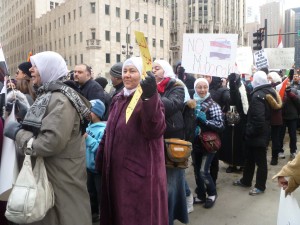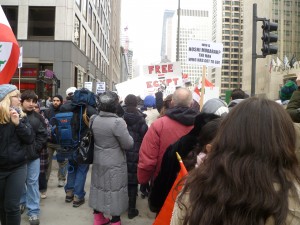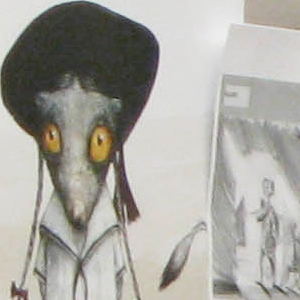By Alejandra Monserrat González Romo, Associate Editor
Mehri Khalil (a 1st-year student in the M.A. Arts Administration and Policy program) was back home in Cairo for the winter break just in time to witness a massive historical change: millions of Egyptians took to the streets to oust Hosni Mubarak from office. After returning to Chicago, Khalil sat down with F Newsmagazine to share her views on the protests and Egypt’s future.
Alejandra Monserrat González Romo: Your country is making history right now, and you had the chance to see it happen. Could you tell me about it?
Mehri Khalil: It all started when they [police] arrested and beat to death Khaled Said [a 28-year-old who attempted to publish a video showing policemen sharing confiscated cocaine] in the middle of the street, where everyone could see. His case attracted media attention and people were at the point where they felt they could not let this happen again.
On Facebook, young Egyptians started the group “We are all Khaled Said” – and this is how the movement started. The first protest [in Cairo] was on Jan 25t; before that, any kind of protest was either ignored or suppressed. I got an invitation, but everyone knows the government monitors the Internet so I was scared to reply and I didn’t go. We thought no one would show up but everyone did.
Then, the government cut off telephone lines and Internet all over the city to prevent further protests; and perhaps they didn’t think it would go on after that, but more people showed up the next day, and the next, and the next. Even people who didn’t mind Mubarak started hating him after his reaction towards the protests [reports indicate that protestors were shot with rubber bullets, water cannons and tear gas, arrested and held without charge, and beaten by the police and the military].
My house is close to Tahir Square and it is kind of over a hill, so I could see it all from there. I could see the National Democratic Party building (which is considered a symbol of corruption) burning, and I could also feel the tear gas.
Four days later, Mubarak gave his first speech saying he was not leaving. Up to that point there were three million people on the streets. I wasn’t there, but I have many friends who were, no one cared about the curfew. The government released people from jail [although this may just have been a rumor] so we all had to protect our houses. My father and many other men were standing with sticks outside our houses to protect them. It was very scary.
The next day the city was in chaos, but it was the first time absolutely everyone was working together; we all wanted the same thing. It was very inspiring. We don’t have streetlights in Egypt; it is police who directs traffic, but the police were gone, so citizens took over their job to keep the city going. You could see all kinds of people sharing food, rich and poor. Others were raising funds for poor people who had lost already several labor days; there were people all over the streets cleaning and helping each other, making sure the protest stayed peaceful. It was hard, but very exciting; I had never seen all my country working together.
AMGR: Wael Ghonim [head of marketing for Google Middle East and Africa, and an internet activist] became an international figure and a symbol for youth. How do Egyptians feel about him?
MK: He had been running a Facebook Fan Page to promote democracy and protests in Egypt. On January 27, he disappeared [Mostafa Alnagar, a major Egyptian opposition figure, reported that Wael Ghonim was alive and detained by the authorities and to be released ‘within hours’]. As days passed, people were losing hope, and they started wondering if staying out protesting was worth it.
When he was released after being detained for 11 days and he gave that extremely emotional interview, people renewed strength to keep going.
AMGR: What happened when Mubarak resigned? You were back in school when that happened, right?
MK: Yes, I felt very bad to leave Egypt precisely in that moment. This is why I feel that I need to have a very good plan to do something for my country when I come back. I had already missed a week of class, so I had to come back to school but we had no idea of what was going to happen. When I left Egypt, the Internet and phone lines were still down and I didn’t even know if I was going to be able to talk to my family to know if they were fine. It was very hard for me to leave, very sad.
The day Mubarak resigned I was home watching Al-Jazeera, and I was listening to the vice president speaking – some nonsense speech, I thought. I was so surprised when he said Mubarak had left. I called my family (the phone was working again) and everyone was thrilled. I had already contacted some Egyptians here in Chicago to see if anyone was going to protest here but after this, the plans changed and we had to celebrate. Only around 50 Egyptians came out to celebrate, I was one of them.
AMGR: Presidential elections are expected to take place on September. Is there someone most of the people would like to lead Egypt?
MK: We don’t know who is taking the lead. There are some names, but I don’t think any of them has the support of the majority. The Muslim Brotherhood already started a political party but they said that no women or COPTS (Egyptian Christians) could be candidates, so this is already not looking very good…
AMGR: Do you think people will accept the results of the elections? Does it look like they are going to be legitimate?
MK: Yes, I think that if people feel they were democratic, they will accept the result. Everyone wants to vote, that is the new fight; there are groups all over the country explaining to poor people that they have to vote and that it is extremely important to do it.
AMGR: How do you feel now that your Egyptians got this far?
MK: I have mixed emotions; it has been exciting and scary. It is very impressive to see history happening before your eyes. Previously we felt like we couldn’t do anything to improve the situation of our country, but the people have united as never before; they feel empowered and like they can really make a change. Everyone feels responsible for what happens next, but now they know what they are able to achieve working together.
I think this showed the world how good our people are, they achieved all this in a peaceful and beautiful way. I hope this fights the stereotypes other countries have about us and about Islam. We are not violent people.









